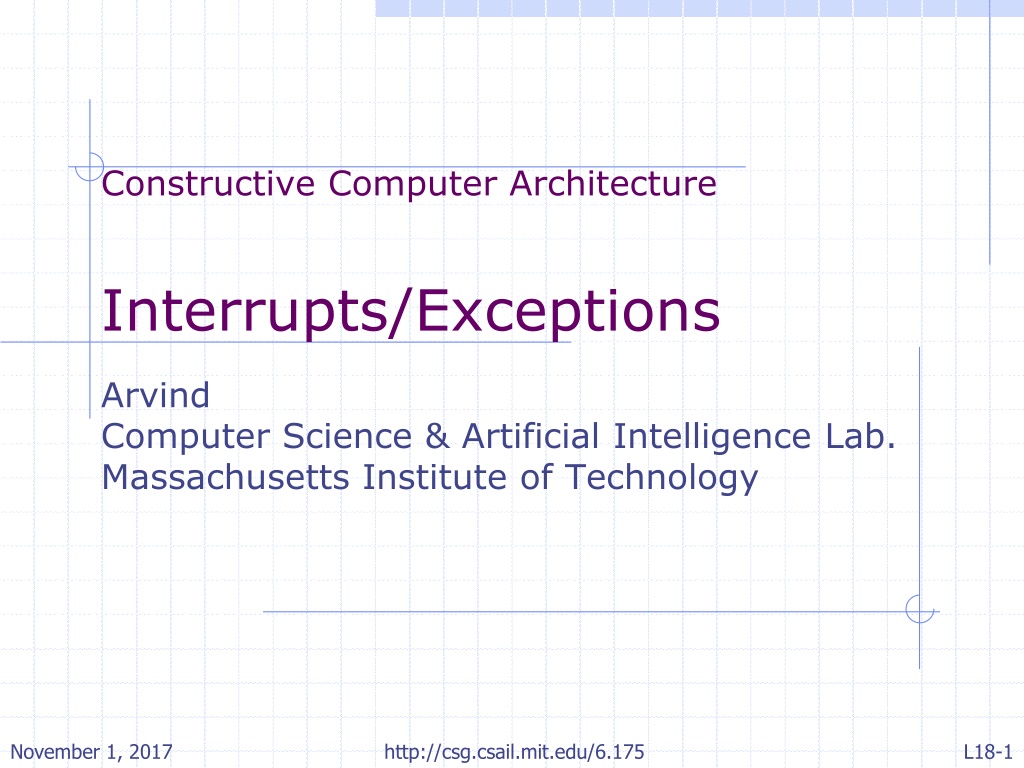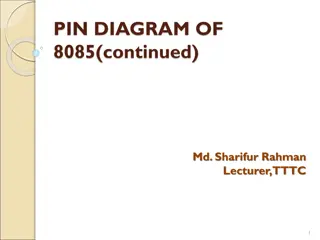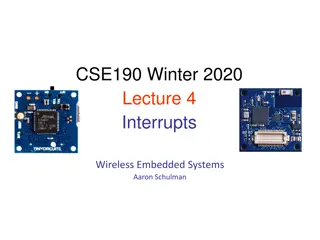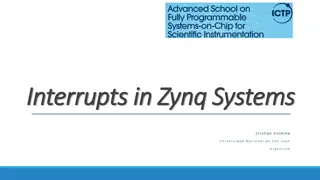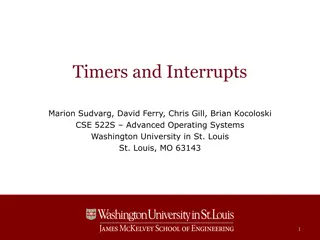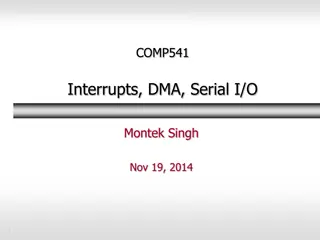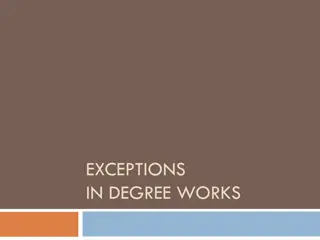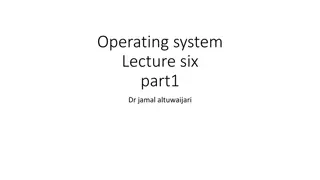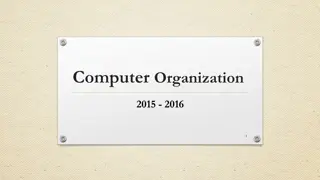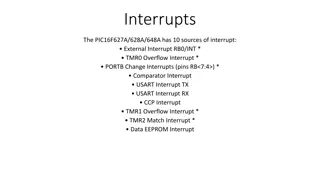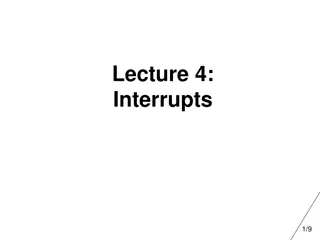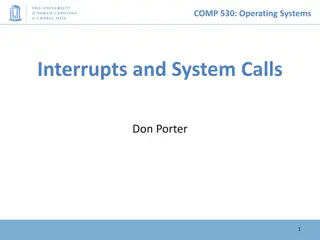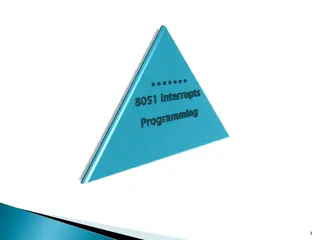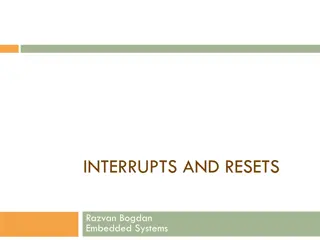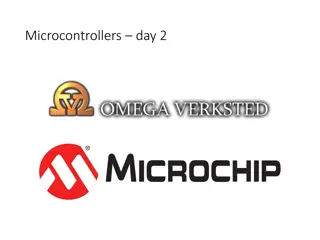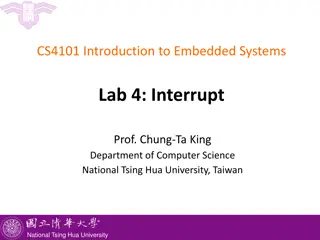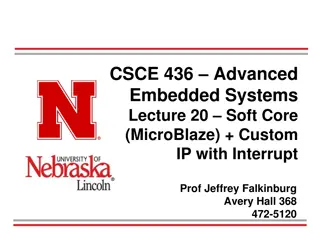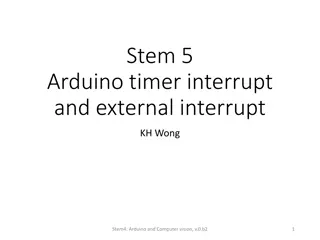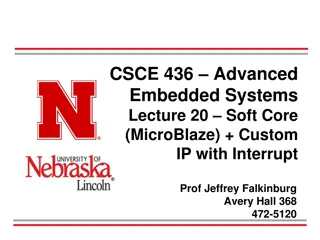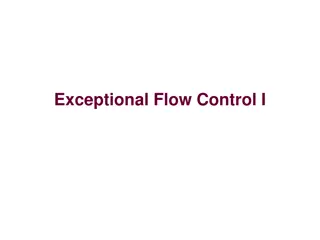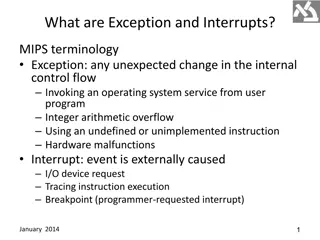Understanding Computer Architecture Interrupts and Exceptions
Computer architecture interrupts and exceptions are essential for handling external events and unexpected conditions during program execution. Interrupts are caused by external events such as I/O requests, timers, or hardware failures, while exceptions occur due to specific instruction executions. When an interrupt or exception occurs, the processor stops the current program, saves the instruction pointer, and transfers control to a designated handler to resolve the issue. Handling interrupts and exceptions efficiently is crucial for the proper functioning of modern processors.
Download Presentation

Please find below an Image/Link to download the presentation.
The content on the website is provided AS IS for your information and personal use only. It may not be sold, licensed, or shared on other websites without obtaining consent from the author. Download presentation by click this link. If you encounter any issues during the download, it is possible that the publisher has removed the file from their server.
E N D
Presentation Transcript
Constructive Computer Architecture Interrupts/Exceptions Arvind Computer Science & Artificial Intelligence Lab. Massachusetts Institute of Technology November 1, 2017 http://csg.csail.mit.edu/6.175 L18-1
Hardware Software Interactions application Application binary interface (ABI) application Operating system Supervisor binary interface (SBI) Hardware Modern processors cannot function without some resident programs ( services ), which are shared by all users Usually such programs need some special registers which are not visible to the users Therefore all ISAs have extensions to deal with these special registers Furthermore, these special registers cannot be manipulated by user programs; therefore user/privileged mode is needed to use these instructions L18-2 http://csg.csail.mit.edu/6.175 November 1, 2017
Interrupt (aka Trap) altering the normal flow of control Ii-1 HI1 interrupt handler HI2 program Ii HIn Ii+1 An external or internal event that needs to be processed by another (system) program. The event is usually unexpected or rare from program s point of view. L18-3 http://csg.csail.mit.edu/6.175 November 1, 2017
Interrupts caused by an external event External asynchronous event input/output device service-request/response timer expiration power disruptions, hardware failure After the processor decides to process the interrupt It stops the current program at instruction Ii, completing all the instructions up to Ii-1(Precise interrupt) It saves the PC of instruction Ii in a special register It disables interrupts and transfers control to a designated interrupt handler running in the privilege mode Privileged/user mode to prevent user programs from causing harm to other users or OS L18-4 http://csg.csail.mit.edu/6.175 November 1, 2017
Exceptions caused by the execution of an instruction The instruction cannot be completed undefined opcode, privileged instructions arithmetic overflow, FPU exception misaligned memory access virtual memory exceptions: page faults, TLB misses, protection violations System call: Deliberately used by the programmer to invoke a kernel service Either the faulting condition is fixed; or the instruction is emulated by the exception handler; or the program is aborted The pipeline must undo any partial execution and record the cause of the exception L18-5 http://csg.csail.mit.edu/6.175 November 1, 2017
Interrupt* handling When an interrupt is caused Hardware saves the information about the interrupt in CSRs: mepc exception PC mcause cause of the exception mstatus.mpp privilege mode of exception ... Processor jumps to the address of the interrupt handler (stored in the mtvec CSR) and increases the privilege level A interrupt handler, a software program, takes over and performs the necessary action *From now on, interrupts and exceptions are used interchangeably L18-6 http://csg.csail.mit.edu/6.175 November 1, 2017
Software for interrupt handling Hardware transfers control to the common software interrupt handler (CH) which: Saves all GPRs into known memory locations Passes mcause, mepc, stack pointer to the IH (a C function) to handle the specific interrupt On the return from the IH, writes the return value to mepc Loads all GPRs from the memory Execute mret, which does: set pc to mepc pop mstatus (mode, enable) stack instruction GPR 1. 2. 3. IH 4. CH 1 2 3 4 5 5. IH a new IH L18-7 http://csg.csail.mit.edu/6.175 November 1, 2017
Saving GPRs Operating system manages the space where GPRs are saved and provides a pointer to the space for the current program For simplicity we ll assume this location is fixed at GPR_BASE RISC-V s memory instructions require the base address to be stored in a GPR Therefore before GPRs can be saved, we need to free up a GPR (say x1) by storing its value in a special scratch register (mscratch) After saving the other GPRs, they are freed up Finally, x1 needs to be restored from mscratch and saved another CSR L18-8 http://csg.csail.mit.edu/6.175 November 1, 2017
Common Interrupt Handler- SW (RISC-V Assembly) common_handler: # entry point for exception handler # save x1 to mscratch to free up a register csrw mscratch, x1 # write x1 to mscratch # get the pointer for storing GPRs li x1, GPR_BASE # save x2 - x31 sw x2, 8(x1) sw x3, 12(x1) ... sw x31, 124(x1) # now registers x2 x31 are free # save original x1 (now in mscratch) csrr x2, mscratch # x2 used as temporary register sw x2, 4(x1) # x1 still points to GPR storage L18-9 http://csg.csail.mit.edu/6.175 November 1, 2017
Common handler- SW cont. Setting up and calling IH_Dispacher common_handler: ... # we have saved all GPRs to stack # call C function to handle interrupt csrr a0, mcause # arg 0: cause csrr a1, mepc # arg 1: epc li a2, GPR_BASE # arg 2: pointer to all saved GPRs ... # set up stack pointer for C-code jal ih_dispatcher # calls ih_dispatcher which may # have been written in C # return value is the PC to resume csrw mepc, a0 # restore mscratch and all GPRs li x1, GPR_BASE; lw x2, 8(x1); lw x3, 12(x1); ...; lw x31, 124(x1) lw x1, 4(x1) # restore x1 last mret # finish handling interrupt L18-10 http://csg.csail.mit.edu/6.175 November 1, 2017
IH Dispatcher (in C) Dispatches to a specific handler based on cause long ih_dispatcher(long cause, long epc, long *regs) { // regs[i] refers to GPR xi stored in stack if(cause == 0x02) // illegal instruction return illegal_ih(cause, epc, regs); else if(cause == 0x08) // system call return syscall_ih(cause, epc, regs); else ... // other causes } Next we give examples of two interrupt Handlers: 1. Software implementation of multiply instruction 2. System call (e.g., printf, open, ...) L18-11 http://csg.csail.mit.edu/6.175 November 1, 2017
SW emulation of MULT instruction mul rd, rs1, rs2 With proper exception handlers we can implement unsupported instructions in SW MUL returns the low 32-bit result of rs1*rs2 into rd MUL is decoded as an unsupported instruction and will throw an Illegal Instruction exception SW handles the exception in illegal_inst_ih() function illegal_inst_ih() checks the opcode and function code of MUL to call the emulated multiply function Control is resumed to epc + 4 after emulation is done (MRET) L18-12 http://csg.csail.mit.edu/6.175 November 1, 2017
Illegal Instruction IH (in C) long illegal_inst_ih(long cause, long epc, long *regs) { uint32_t inst = *((uint32_t*)epc); // fetch inst // check opcode & function codes if((inst & MASK_MUL) == MATCH_MUL) { // is MUL, extract rd, rs1, rs2 from inst int rd = (inst >> 7) & 0x01F; int rs1 = ...; int rs2 = ...; // emulate regs[rd] = regs[rs1] * regs[rs2] emulate_multiply(rd, rs1, rs2, regs); return epc + 4; // done, resume at epc+4 } else abort(); } L18-13 http://csg.csail.mit.edu/6.175 November 1, 2017
System call as an instruction The ecall instruction raises an exception; its meaning is derived based on conventions of the operating system Register a7 contains the desired function, register a0,a1,a2 contain the arguments, result is returned in register a0 a0 a7 are register name aliases (i.e. x10 x17) Processor can t function without the cooperation of the software Single-cycle implementation: next few slides L18-14 http://csg.csail.mit.edu/6.175 November 1, 2017
Syscall Interrupt Handler (in C) long syscall_ih(long cause, long epc, long *regs) { // figure out the type of SCALL (stored in a7/x17) // args are in a0/x10, a1/x11, a2/x12 long type = regs[17]; long arg0 = regs[10]; long arg1 = regs[11]; long arg2 = regs[12]; if(type == SysPrintChar) { ... } else if(type == SysPrintInt) { ... } elseif(type == SysExit) { ... } else ... // ECALL finshes, we need to resume to epc + 4 return epc + 4; } L18-15 http://csg.csail.mit.edu/6.175 November 1, 2017
Decode function DecodedInst decode(Data inst, Status status); DecodedInst dInst = ?; ... opSystem: begin case (funct3) ... fnPRIV: begin // privilege inst dInst.iType = (case(inst[31:20]) fn12ECALL: Syscall; // sys call // MRET can only be executed under privilege mode fn12MRET: isPrivMode(status) ? MRet : NoPermit; ... default: Unsupported; endcase); dInst.dst = Invalid; dInst.src1 = Invalid; dInst.src2 = Invalid; dInst.imm = Invalid; dInst.aluFunc = ?; dInst.brFunc = NT; end ... endcase end ... return dInst; endfunction November 1, 2017 http://csg.csail.mit.edu/6.175 typedef enum {Alu,..., NoPermit,Syscall,MRet} IType L18-16
Add Execute code for setting CSRs ... if (eInst.iType==Syscall) begin csrf.setStatus(statusPush(csrf.getStatus)); csrf.setCause(32 h08); // cause for System call csrf.setEpc(pc); end else if (eInst.iType==MRet) begin csrf.setStatus(statusPop(csrf.getStatus)); end L18-17 http://csg.csail.mit.edu/6.175 November 1, 2017
Redirecting PC single cycle implementation if (eInst.iType==Syscall) pc <= csrf.getTvec; else if (eInst.iType==MRet) pc <= csrf.getEpc; else pc <= eInst.brTaken ? eInst.addr : pc + 4; Interrupt redirection is done from the last stage; speed is not a paramount concern in hardware handling of interrupts L18-18 http://csg.csail.mit.edu/6.175 November 1, 2017
Exception Handling in pipelined machines Commit Point Inst. Mem Data Mem Decode PC D E M W + Illegal Opcode Data address Exceptions Overflow PC address Exception Cause Ex D Ex E Ex M EPC PC D PC E PC M Select Handler PC External Interrupts Kill F Stage Kill D Stage Kill E Stage Kill Writeback 1. An instruction may cause multiple exceptions; which one should we process? 2. When multiple instructions are causing exceptions; which one should we process first? November 1, 2017 http://csg.csail.mit.edu/6.175 from the earliest stage from the oldest instruction L18-19
